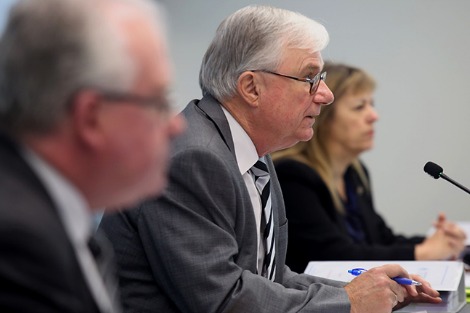Church Congregations Have Role in Healing Abuse Victims
By Neil Ormerod
On Monday (18 August), we are beginning Round 8 of the Royal Commission’s investigation into the Catholic Church’s handling of sexual abuse allegations. While some of these have passed without significant media attention, and in one case the Wollongong church came out looking not too bad, this upcoming round, like the Sydney based investigation into the John Ellis case, promises to be explosive in its content. We received a preview of the matters likely to be investigated in the ABC’s Four Corners on 11 August. The program aired material relating to the Melbourne Response established by then Archbishop Pell to be the Melbourne Archdiocese alternate response to the national protocols being developed at that time by the Catholic Bishops’ Conference, Towards Healing. The program dealt with a number of specific cases of abuse including the case of Chrissie and Anthony Foster, whose two daughters Emma and Katie were assaulted by serial abuser Fr Kevin O'Donnell. Their case was one of the first to be processed by the Melbourne Response process and has already been subject to investigation by a Victorian Parliamentary Inquiry into the handling of child abuse by religious and other organisations. That inquiry involved some feisty, if not heated, exchanges between the parliamentarians and Cardinal Pell. His subsequent appearances at the Royal Commission on the John Ellis case were more circumspect. At the closure of the Commission investigation of that case the Cardinal was asked to make himself available for this coming round into its investigation into the Melbourne Response, to which he agreed he would if possible. So we can expect another probing process of question and answer with Cardinal Pell the star witness. Once again we will have the spectacle of a cardinal of the Church humbled before a secular authority. The Four Corners program also highlighted the prolonged suffering of a parish and school community at Doveton, Victoria, where it seems a number of paedophile priests were active over a period of decades. In one case, involving Fr Peter Searson, then Bishop Pell received a deputation from the local school making complaints against the priest. No action was taken to remove the priest from his position. In his evidence to the Victorian inquiry Cardinal Pell noted that he had spoken sternly to Fr Searson and told him to 'follow the protocols', though what protocols were being referred to was not made clear! While the program focussed on the inaction of the relevant Church authorities, I was somewhat aghast that at no time did it seem to occur to the teachers at the school to approach the local police concerning the abusive and criminal actions of the priest. This may have been prior to the era of mandatory reporting, but surely they would have known that the priest’s actions were criminal. Why then have recourse to a purely internal Church process, particularly when it proved so ineffective? Unfortunately the program did not explore this question. However, it did highlight for me that the problem of cover-up is not just one for the hierarchy, in particular the senior leaders of the Church. There is a 'co-dependency' issue here in that the laity look to the leadership to solve problems 'in-house', problems which really should be dealt with by civil authorities. Time and again the Royal Commission has heard Church leaders defend their actions by noting that victims did not want to go to the police, that they wanted the matter dealt with through internal Church processes. Even the laity, and at times the victims themselves, can be caught up in a culture which seeks to protect the reputation of the Church over and against the need to protect present and future victims. And when victims do seek to break through this conspiracy of silence, they are the ones who are ostracised by their communities. Undoubtedly the Royal Commission will propose countless policies and procedures, but these will not touch the heart of the issue. Similarly the recent announcement by the Truth, Justice and Healing Council proposing an independent redress scheme for survivors, while to be welcomed, does not address the depth of the problem. So long as the culture whereby both the hierarchy and the laity spontaneously seek to 'protect the church from scandal' as a first option, there will be no major change in the situation. We can see a more creative response in the recent actions by the Anglican Church in Canberra and Goulburn. A public apology to sexual abuse victims was either read out to congregations at Lamentation Sunday services, or a video of the apology delivered by the local bishop was played in each parish church. Congregations need to be brought into the process of finding a solution to our mess, to see that they too have a role to play in healing of and reparation to the victims. As a community we need liturgies of lamentation, of repentance, of reparation and healing if the church is to become a safe place for victims of abuse.
|
.
Any original material on these pages is copyright © BishopAccountability.org 2004. Reproduce freely with attribution.
